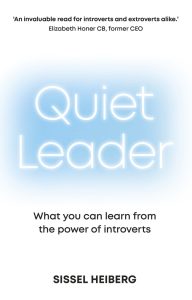By Sissel Heiberg, below, author of Quiet Leader: What you can learn from the power of introverts
 If you’re tall, odds are you get paid more than the rest of us. That’s because humans aren’t rational – we’re swayed by things like physical appearance because they act as a proxy for something else, like authority and ability. This happens because our brains a long time ago developed shortcuts to make things easier for us and to help us understand the world around us without the overloading that would result if we were to analyse every piece of information coming our way every day. So instead, our brains created rules and convert them to meaning – say, someone shows up to a team meeting with wet hair, and we might extrapolate they were in a rush that morning, that they’re a bad planner, that they’re not reliable, or that they’re stressed. We make these kinds of judgements all the time, including when taking big decisions about other people and about ourselves, even though they’re generally based on assumptions and stereotype.
If you’re tall, odds are you get paid more than the rest of us. That’s because humans aren’t rational – we’re swayed by things like physical appearance because they act as a proxy for something else, like authority and ability. This happens because our brains a long time ago developed shortcuts to make things easier for us and to help us understand the world around us without the overloading that would result if we were to analyse every piece of information coming our way every day. So instead, our brains created rules and convert them to meaning – say, someone shows up to a team meeting with wet hair, and we might extrapolate they were in a rush that morning, that they’re a bad planner, that they’re not reliable, or that they’re stressed. We make these kinds of judgements all the time, including when taking big decisions about other people and about ourselves, even though they’re generally based on assumptions and stereotype.
In a business context, these mental shortcuts affect introverts disproportionately because what we associate with introverted behaviours are negative assumptions that have built up over time. One such mental shortcut is that a good leader will be vocal about their opinions, and so when someone makes a statement with certainty, we tend to assume that person knows what they’re talking about. An introvert, however, is more likely to pause and reflect before making any bold statements, and not shy away from complexity, which might be interpreted as hesitation. This is often referred to as dominant behaviour bias, and it means we might see an introvert’s reflection as lack of certainty. It doesn’t work the other way around, as a negative against extroverts: An extrovert will use the process of talking in order to work through their thoughts, and even though we know it’s a good thing if a leader thinks things through before announcing substantial things like the corporate strategy of their business or the safety implications of a new product, we still see the extrovert making bold – if unsubstantiated – claims as evidence they’re strong leadership material.
There are a number of biases like the dominant behaviour bias that affect the introvert in both small and large businesses. A similar one is action bias, where we assume that any action is better than no action – it doesn’t matter if it’s the right one or not, we just prefer action to be taken (and we usually fail to recognise that thinking and reflection are actions too). This leads to a bias against introverts because so much of the introvert’s initial activity is internal – instead of a rash decision, which is visible and immediate, there’s reflection and analysis, which is internal and quiet. Though no less powerful, the introvert’s approach is still seen as “less than” because it’s not as immediately obvious what the action being taken is. This is despite the fact that many business scenarios today are too complex to make based on gut feeling, and it’s been proven repeatedly that decisions made following reflection are usually the better ones. Because introverts do the internal work first, many mistakenly assume that there’s no outward action, ever – no decisiveness and no willingness to make tough calls. But this would be wrong; introverts simply just introduce a pause first before being decisive.
One of the reasons why the negative impression of introverts exists in the first place is that humans are also victims of the anchoring and primacy effects. These are heuristics we use where we’re led by the first person to talk in a meeting (primacy) and by the first opinion being presented (anchoring). One study showed that the anchoring effect even exists across unrelated topics; researchers asked study participants to spin a wheel of fortune giving out random numbers, then asked them how many countries are in the UN, and found that there was a correlation between the answer given on the UN question with the random number from the wheel of fortune! As humans we let ourselves be influenced by many things around us, and we’re not always aware of it happening. Since introverts generally don’t talk early on in work meetings, given we prefer to digest information and compare what’s being said with known facts before commenting, introverts have less influence on the initial direction of a discussion, thanks to the primacy and anchoring effects (there are ways around this, such as connecting dots heard throughout the meeting, post-meeting follow-ups or requesting agendas for all meetings).
Humans also have a tendency to be swayed by confirmation bias, which is when we only see what we expect to see. Because the introvert stereotype as a wallflower is so ingrained in the popular psyche, we tend to only pay attention to situations and only remember examples where a stereotype plays out. This means we might fail to notice situations where introverts do voice their opinions early, and the stereotype is perpetuated. This is particularly problematic for the introvert because they’re also being held back by the language we use to describe behaviour, which is skewed in favour of the extrovert: We talk about extroverts as gregarious (rarely do we use the more negative “too loud”), yet we describe introverts as “too quiet”, instead of the more positive “reflective”. This tells us subconsciously that we value speaking more than reflection, and it affects our perception of the people who hold those behavioural preferences.
It’s important to clarify, however, that talking in itself doesn’t only belong to extroverts. Many, many introverts find themselves in the public eye, hold senior positions that require commanding large groups of people, or work as actors or performers. These have no problem with – and actively seek out – professions requiring them to do a lot of talking. So when we say that introverts tend to talk less, we only refer to the pause that the introvert introduces before speaking, and the fact that they might need a quiet evening to themselves after a big event – not implying that introverts don’t talk at all, or as a judgement on the quality of the words being spoken. Being a quiet leader doesn’t mean you’re a silent one!
Part of the problem with stereotypes to begin with, of course, is that they are just that – stereotype. We’re all unique, and introversion takes on different forms for different individuals – some feel introversion most strongly in social situations and need more time alone, and others prefer to reflect for longer before speaking. We would do well to remind ourselves that mental shortcuts are just support and not a replacement for seeing another person as the unique individual they are, and to consider whether we’re actually employing a heuristic in a situation or if we’re thinking independently. The more we perpetuate the stereotype, the less helpful it becomes, so it’s important that we all consciously consider the biases we could have – even the ones we may not be conscious of – and ask ourselves if they genuinely reflect reality. This will enable all organisations to improve their culture, leaders will become better, and performance will improve.
 Sissel Heiberg is author of Quiet Leader: What you can learn from the power of introverts out now, published by Pearson
Sissel Heiberg is author of Quiet Leader: What you can learn from the power of introverts out now, published by Pearson


Comments are closed.